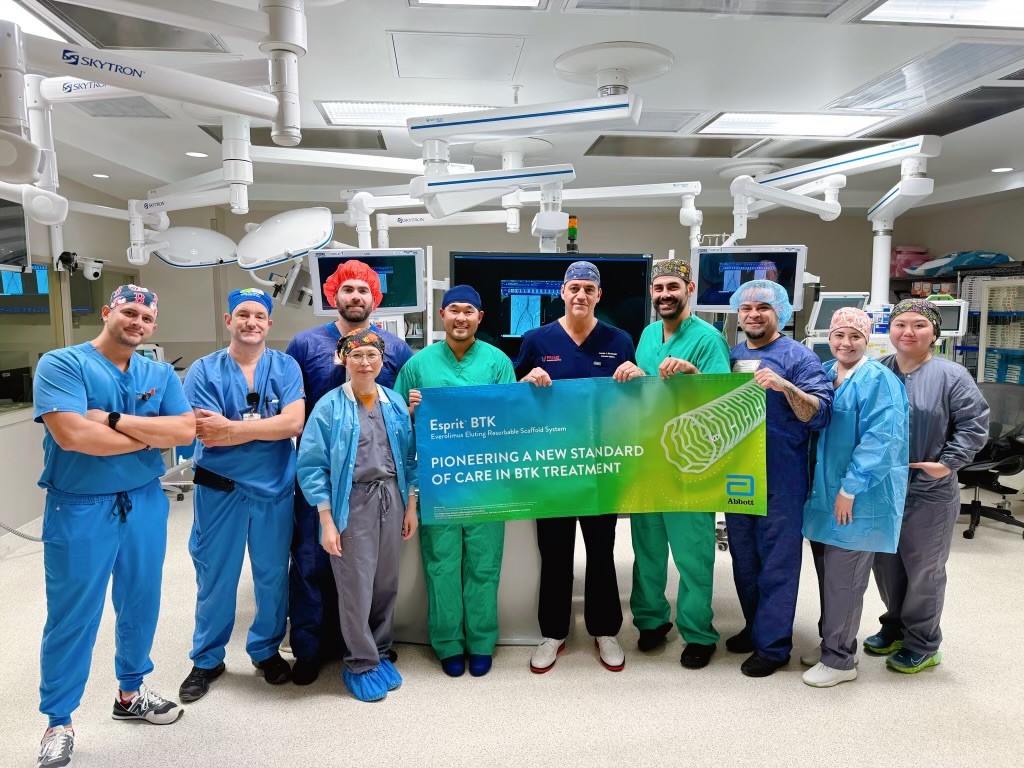Delray Medical Center (DMC) successfully implanted the Esprit™ BTK Everolimus Eluting Resorbable Scaffold System (Esprit™ BTK System), a first-of-its-kind dissolvable stent for people with chronic limb threatening ischemia (CLTI) below-the-knee (BTK). DMC is the first hospital in Palm Beach County to utilize the Esprit in surgery.
The procedure was completed by vascular surgeon Dr. Joseph Ricotta, National Medical Director of Vascular Surgery and Endovascular Therapy for Tenet Healthcare and Professor of Surgery and Program Director of the vascular surgery fellowship at Florida Atlanta University School of Medicine.
Approved by the U.S. Food and Drug Administration (FDA) in April 2024, the Esprit BTK System is designed to keep arteries open and deliver a drug called everolimus to support vessel healing prior to dissolving. The Esprit BTK System is comprised of materials similar to dissolving sutures. Once the blockage is open, the device is implanted through a catheter based minimally invasive procedure. The scaffold helps heal the vessel and provides support until it is strong enough to remain open on its own.
“The FDA’s approval of Esprit BTK System is a step forward in below-the-knee therapy. This new treatment option supports healing while reducing the risk of long-term complications,” said Dr. Ricotta. “We’re excited to be able to offer our patients the latest technological advancements to treat chronic limb-threatening ischemia below-the-knee such as Abbott’s new bioresorbable stent.”
Chronic limb-threatening ischemia below-the knee is a severe form of PAD that occurs when arteries become clogged with plaque, and blood flow and oxygen can’t reach the lower leg and foot. Over 20 million people in the U.S. are living with PAD and only 10% of those people have been diagnosed. PAD disproportionately affects the Black and Hispanic communities with nearly 1 in 3 Black adults and 1 in 5 Hispanic adults developing the disease. Risk factors for PAD also include current or prior smoking, diabetes, high blood pressure, and high cholesterol.
Dr. Ricotta serves as National Medical Director of Vascular Surgery and Endovascular Surgery for Tenet Healthcare and founded and directs the FAU Vascular Surgery Fellowship and is a professor of surgery at FAU School of Medicine. He is a nationally and internationally recognized expert in the field of vascular and endovascular surgery, earned his undergraduate degree at Yale University and his medical degree from Jefferson Medical College. He completed his residency in general surgery at Johns Hopkins Hospital and was a traveling scholar and specialist registrar in vascular surgery at Oxford University in England. In addition, he completed a vascular and endovascular surgery fellowship at the Mayo Clinic in Rochester, Minnesota, followed by an advanced endovascular surgery fellowship at the Cleveland Clinic. He is the first surgeon in the U.S. to use endovascular robotics to perform minimally invasive vascular surgery and has authored more than 300 publications and delivered more than 500 lectures on the national and international stage. He has been named a Castle Connolly “America’s Top Doctor” 13 years in a row and earned a position on Newsweek’s “America’s Best Vascular Surgeons 2024” list.
For more information about vascular treatments offered at Delray Medical Center, please visit www.delraymedicalctr.com or call (561) 495-0400.
